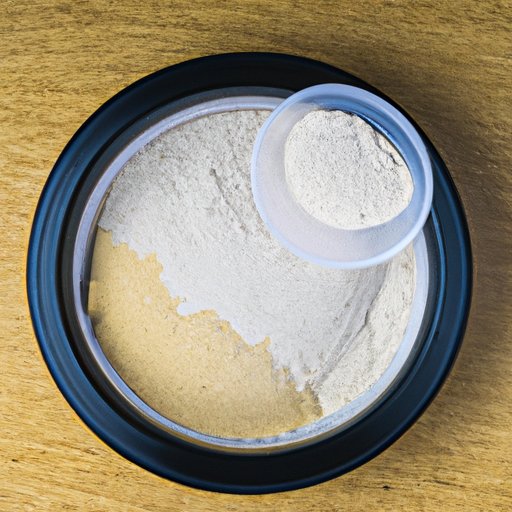
Introduction
Protein is an essential nutrient that is responsible for building and repairing tissues in the body. It is made up of amino acids, which are the building blocks of life. Protein is also crucial for maintaining a healthy immune system and producing hormones and enzymes. While protein is an important part of a healthy diet, many people are unsure of how much they should be consuming on a daily basis. In this article, we will explore the recommended daily protein intake, the potential risks of consuming too much protein, and tips for maximizing your protein intake.
The Ultimate Guide to Protein Intake: How Much is Too Much?
The amount of protein each person needs can vary depending on their age, gender, weight, and level of physical activity. According to the United States Department of Agriculture (USDA), adult men and women should consume 0.8 grams of protein per kilogram of body weight per day. For example, a person weighing 68 kilograms (150 pounds) would need to consume 54 grams of protein per day. However, individuals who participate in regular physical activity may need more protein to support muscle growth and repair.
The recommended daily protein intake for athletes and those who engage in intense physical activity is between 1.2-1.7 grams of protein per kilogram of body weight per day. For example, a person weighing 68 kilograms who is regularly active would need to consume between 82-116 grams of protein per day.
While protein is an important nutrient, too much of it can have negative consequences on the body. Consuming excessive amounts of protein can put added strain on the kidneys and liver, which are responsible for removing waste from the body. In extreme cases, consuming too much protein can lead to kidney damage and dehydration. It is important to consume the recommended daily protein intake based on your individual needs and avoid overconsumption of this nutrient.
Protein 101: Everything You Need to Know About Daily Intake
Protein is essential for the body to build and maintain its tissues, including muscles, bones, skin, and hair. It is also responsible for producing important hormones, enzymes, and antibodies that help keep the body healthy. Protein is made up of amino acids, which are divided into two categories: essential and non-essential amino acids.
Essential amino acids cannot be produced by the body and must be obtained through food. Non-essential amino acids, on the other hand, can be produced by the body. There are 20 different amino acids that make up protein, and each type of protein contains a unique combination of these amino acids.
Calculating your individual protein needs can be done by taking into account your body weight and level of physical activity. To determine your protein needs, simply multiply your weight in kilograms by the recommended amount of protein per kilogram of body weight based on your level of physical activity. For example, a person who weighs 68 kilograms and participates in regular physical activity would need to consume approximately 82-116 grams of protein per day.
The Truth About Protein: Debunking Common Myths and Misconceptions
There are many myths and misconceptions surrounding protein, including the belief that more is always better and that animal-based proteins are superior to plant-based proteins. While protein is important for overall health and wellness, consuming excessive amounts of protein can put added strain on the body, particularly the kidneys and liver.
It is also a common misconception that animal-based proteins are superior to plant-based proteins. However, many plant-based proteins are just as effective as animal-based proteins, and they come with additional benefits such as fiber, which can help lower cholesterol levels and improve gut health.
Maximizing Your Protein Intake: Tips and Tricks for Busy People
For busy individuals, finding time to incorporate protein into their diets can be challenging. However, there are many quick and easy ways to add protein to your meals throughout the day. Some simple protein-rich snacks include nuts, seeds, and Greek yogurt. Adding protein powder to smoothies or meals can also help increase protein intake.
For those who are short on time, meal prep can be a great way to ensure you are consuming enough protein throughout the week. Some options include preparing chicken or tofu dishes in advance or prepping hard-boiled eggs for a quick and easy snack.
Protein and Exercise: How Much Do You Really Need?
Consuming protein after a workout can help support muscle growth and repair. The optimal time to consume protein after a workout is within 30 minutes to one hour. The recommended amount of protein varies depending on the type and intensity of exercise. For example, endurance athletes may need more protein than those who engage in low-intensity exercise.
The Risks of Excess Protein: What You Need to Know
While protein is an essential nutrient, consuming too much of it can have negative consequences on the body. Excessive protein consumption can put added strain on the kidneys and liver, and may lead to dehydration. It is important to consume the recommended daily protein intake based on your individual needs and avoid overconsumption of this nutrient.
Conclusion
Protein is an essential nutrient that is responsible for building and repairing tissues in the body. The recommended daily protein intake varies based on an individual’s age, gender, weight, and level of physical activity. Consuming too much protein can lead to negative consequences, including kidney damage and dehydration. To maximize your protein intake, try incorporating protein-rich foods into your diet and meal prepping for quick and easy meals throughout the week. Remember to consume the recommended amount of protein based on your individual needs and goals.




